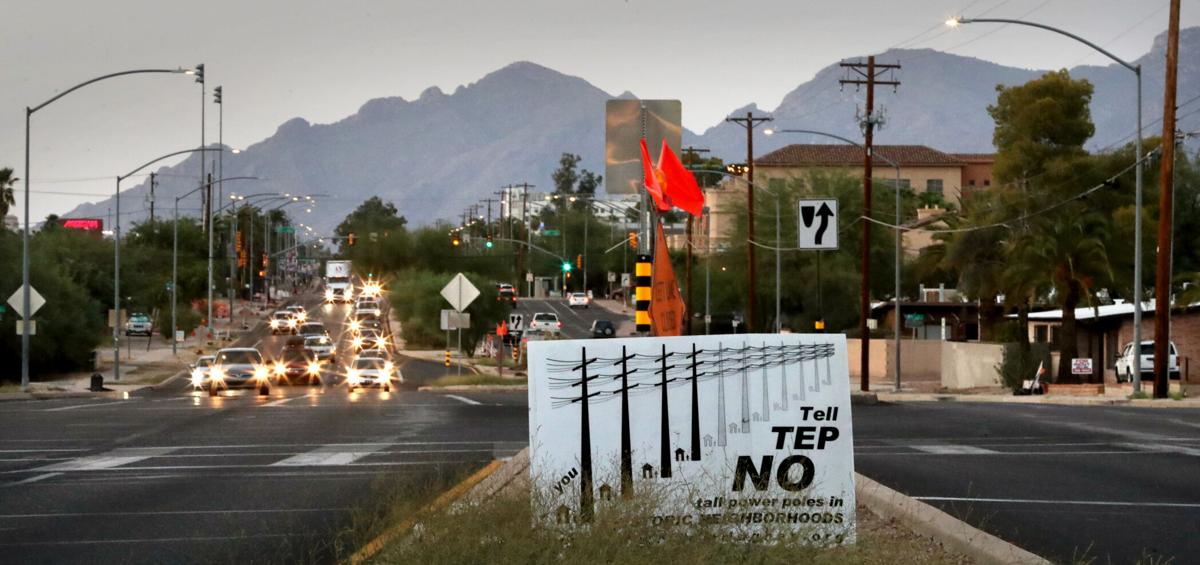Tucson Electric Power Co. and the city of Tucson will try to solve their dispute over TEP’s controversial plan to run a high-voltage overhead power line through central Tucson.
At TEP’s request, the Arizona Power Plant and Transmission Line Siting Committee delayed the planned start of hearings on Monday, Sept. 13, for TEP’s Kino to DeMoss-Petrie 138-kilovolt Transmission Line project until February.
TEP requested more time to discuss with city officials possible alternative routes to minimize the impact on several historic neighborhoods and a city-designated “gateway corridor” along Kino Parkway and North Campbell Avenue — including the possibility of installing all or part of the line underground.
While TEP requested a 90-day continuance, the line-siting committee had to push the start of the proceedings to Feb. 7 because of scheduling conflicts.
Councilman Steve Kozachik, whose ward includes Sam Hughes and other historic neighborhoods, said he’s pleased there is time for further discussion though he thinks those talks should have begun long ago.
“At least now we have a seat at the table,” he said. “We’re saying, there may be appropriate spaces within the gateway corridor to over-ground it, but let’s come to the table, let’s talk … let’s see what portions are candidates for undergrounding or over-grounding.”
TEP has applied to construct the transmission line, including towers up to 110 feet tall, from a substation near East 36th Street and Kino Parkway to a substation near West Grant Road and Interstate 10, to improve overall service reliability and serve the University of Arizona campus.
But TEP’s preferred route up Kino and North Campbell would run adjacent or through several historic Tucson neighborhoods, including Jefferson Park and Sam Hughes, drawing sharp opposition from neighborhood groups who say the line will destroy views and property values, and want TEP to bury the line.
TEP says “undergrounding” the line is prohibitively expensive and contends it would be unfair to pass that cost along to all ratepayers.
The city says TEP is prohibited from erecting overhead lines along Kino Parkway and Campbell under city ordinances protecting city-designated gateway corridors.
During a pre-hearing conference on Sept. 8, an attorney for TEP said city manager Michael Ortega had discussed the matter with TEP Vice President Erik Bakken on a call and agreed to continue to work to find a route that would satisfy the city and the neighborhoods.
TEP has estimated the extra cost of burying up to 6 miles of the roughly 7-mile line at between $55 million and $63 million.
Matt Derstine, an attorney representing TEP, said that so far, no one has volunteered to help pay for undergrounding the line, but possible funding sources include the city’s franchise fee and its utility tax.
Attorneys for the Sam Hughes Neighborhood Association and Banner Health, operator of Banner University Medical Center, said they were leery that the city and TEP would reach a deal that would ignore their concerns but were satisfied with assurances they would be included in discussions as appropriate.
The downtown intersection at North Stone Ave. and East Toole Ave./West Franklin Street has fully reopened following road work as the lengthy Downtown Links project continues in the area. Video courtesy of Tucson Department of Transportation and Mobility.
The intersection had partially reopened at the end of August as crews worked on phase three of the Downtown Links construction project that will connect Barraza-Aviation Parkway and Interstate 10. Tucson's Department of Transportation and Mobility announced the morning of Sept. 16, 2021 that the intersection is now open to traffic in all directions.
Some of the recent work at the intersection included adding catch basins and an underground storm drain system. The Stone Avenue underpass can be used as an alternative to the now-closed North Sixth Avenue underpass east of the intersection.





